Key takeaways:
- DJ representation enriches the music scene by showcasing diverse backgrounds, fostering inclusivity and empowering emerging talent.
- DJs impact nightclub culture by shaping social interactions, influencing trends, and evoking nostalgia through their music choices.
- Challenges for DJs include balancing artistic expression with audience demands, facing pressure to innovate, and dealing with financial struggles in a competitive industry.
- Promoting diverse lineups and creating inclusive spaces is essential for better representation and enriching the DJ scene.
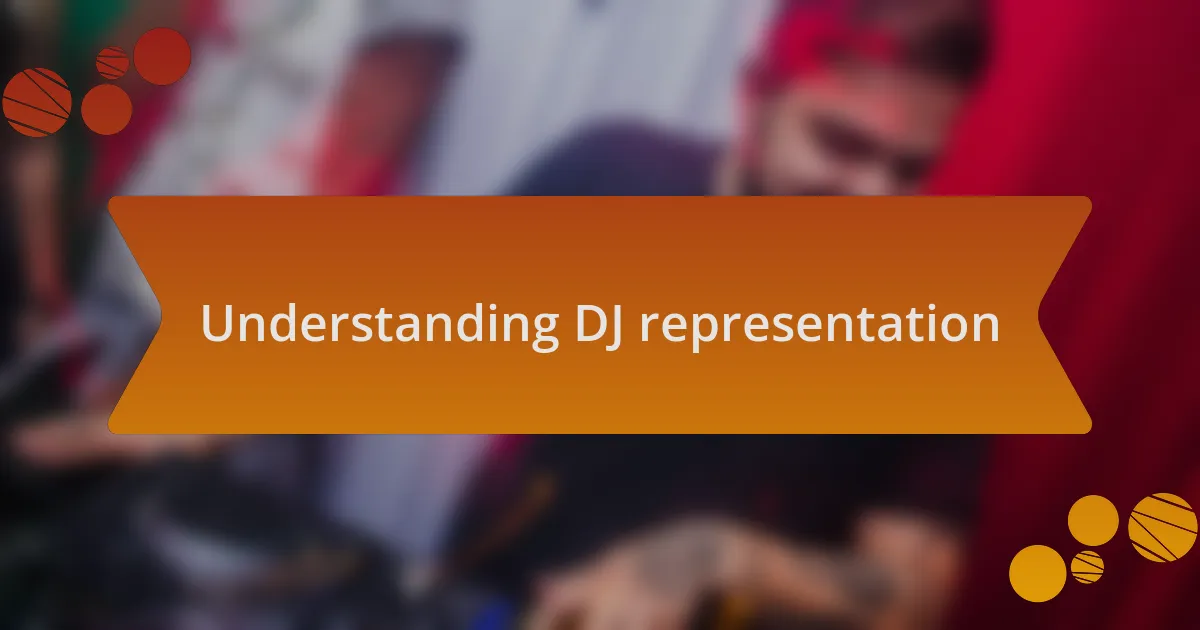
Understanding DJ representation
DJ representation goes beyond just the music; it encompasses the culture, identity, and diversity within the scene. I remember attending a local club night where the lineup featured a range of talented DJs from different backgrounds. It struck me how their unique styles and perspectives not only enriched the experience but also resonated with the audience on a deeper level. Isn’t it fascinating how a diverse lineup can create a more vibrant atmosphere?
When considering DJ representation, we must ask ourselves: who gets to be heard and celebrated? In my own experience, I’ve seen incredible female DJs often overlooked in favor of their male counterparts, which is disheartening. Their contributions bring a fresh energy, and it’s essential that we amplify these voices to foster inclusivity. We all benefit when different perspectives come together to shape the soundscape.
Furthermore, representation also affects the next generation of DJs. I recall a young aspiring DJ who expressed doubt about stepping into the scene because she rarely saw anyone like her behind the decks. This highlights the need for increased visibility, showing that success in this industry comes in many forms. How can we inspire more emerging talent if we don’t actively promote a wide array of voices? It’s a vital conversation to engage in, and one I’m passionate about.
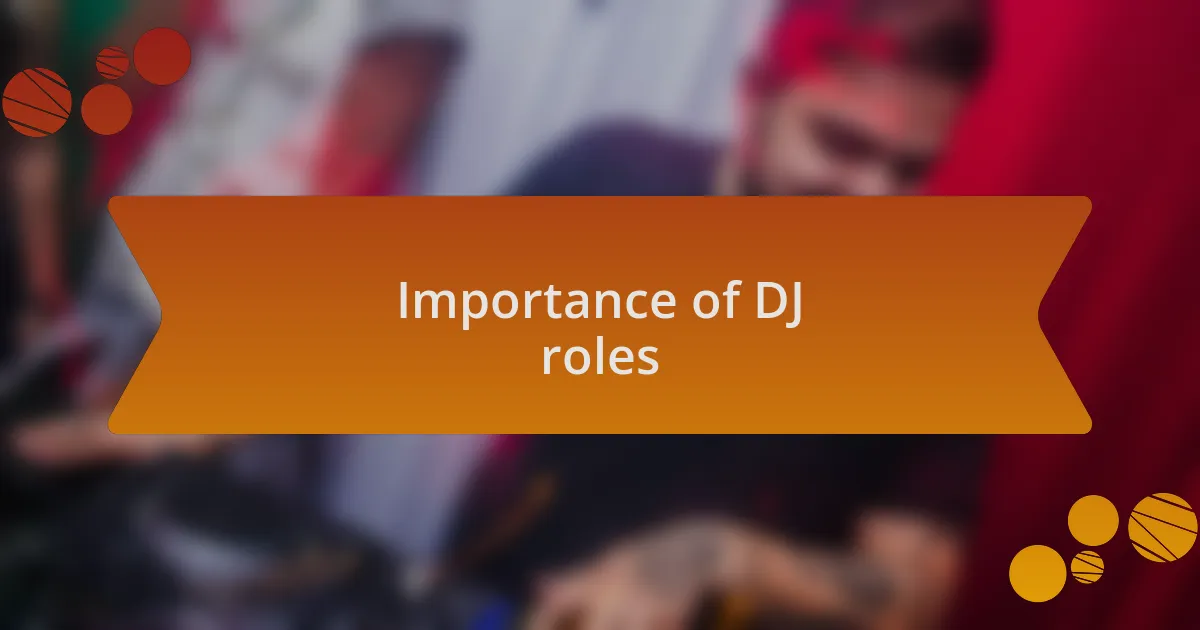
Importance of DJ roles
DJs play a crucial role in shaping the overall vibe of a nightclub, influencing not just what we hear but how we feel. I once attended a night where the DJ expertly blended genres, creating an infectious energy that had everyone on the dance floor. It made me realize that a great DJ can transform an ordinary evening into an unforgettable experience. What do you think makes a DJ’s selection of tracks so impactful?
Moreover, DJs are often seen as cultural ambassadors within the music scene. Their choices can reflect and celebrate the diverse backgrounds of their audience. I vividly recall a set where the DJ dedicated a track to a local cultural community, immediately connecting with the crowd. This act wasn’t just about the music; it was a powerful moment that reinforced our shared identity. How vital do you think these connections are in fostering community within nightclub culture?
Finally, the role of a DJ extends to pushing musical boundaries and introducing audiences to new sounds. I remember discovering a genre I had never heard before at a club, thanks to a knowledgeable DJ who dared to take risks. This experience opened my ears and broadened my musical palate, illustrating how important it is for DJs to innovate. Isn’t it exciting to think about how a single set can spark new interests and inspire both listeners and fellow artists?
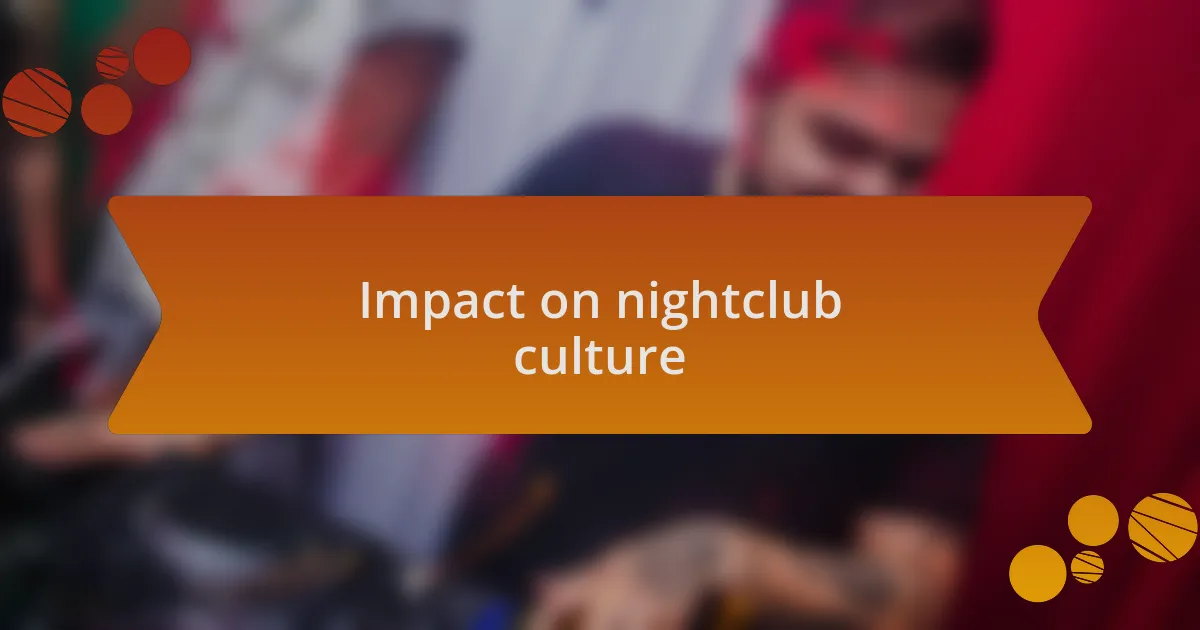
Impact on nightclub culture
The impact of DJs on nightclub culture is profound, as they not only curate the musical experience but also shape social interactions among partygoers. I recall a night at a crowded venue where the DJ seamlessly created a sonic journey that made strangers feel like friends. It’s fascinating how music can dissolve barriers; have you ever felt that sense of unity on the dance floor?
Beyond just the beats they play, DJs influence fashion, trends, and even the language of nightlife. I once attended a club night themed around a particular genre, which encouraged attendees to dress in ways that echoed its history. The creative energy was palpable, and it made me wonder how much a DJ’s influence can extend into the broader culture outside the nightclub.
DJs also have a unique ability to evoke nostalgia through their sets, tapping into emotions tied to specific tracks. There was a moment during one of my favorite DJ’s performances when they played a song from my teenage years, instantly bringing back memories of carefree summer nights. It’s amazing how a single remix can unlock a flood of emotions; isn’t it remarkable how deeply music can resonate with our personal experiences?
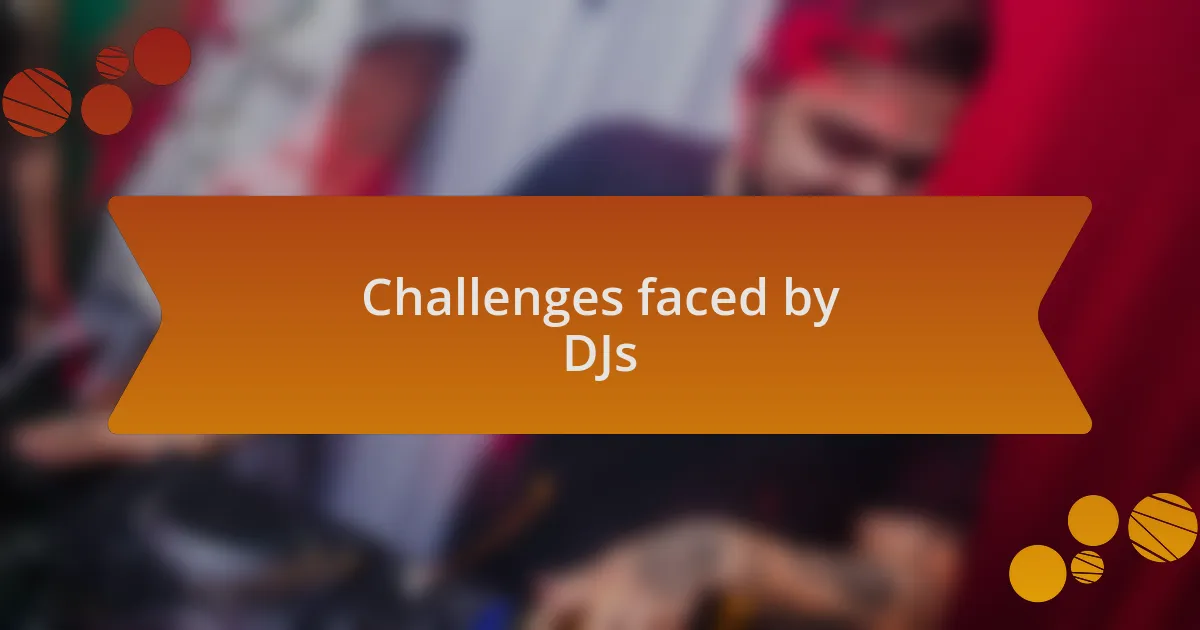
Challenges faced by DJs
DJs face numerous challenges in an ever-evolving music scene, particularly in balancing artistic expression with the demands of the audience. I’ve witnessed countless times when a DJ had to adapt their set on the fly, reading the crowd’s energy and shifting genres mid-performance to keep the dance floor alive. Have you ever seen a DJ switch gears so seamlessly that it felt like they were tapping into a collective vibe? It’s a skill that requires intuition and an understanding of the audience, making each performance unique yet precarious.
Another significant hurdle is the pressure of constant innovation. As music genres and trends evolve, DJs must stay relevant and ahead of the curve. I remember chatting with a DJ who shared their struggle to create fresh mixes while faced with the temptation to rely on popular hits. It takes courage to experiment and bear the risk of not pleasing everyone; haven’t we all felt that blend of excitement and anxiety when stepping into unfamiliar territory?
Moreover, the financial realities of the industry can be daunting. Many emerging DJs invest heavily in equipment, travel, and promotional costs, often without guaranteed returns. I once spoke to a friend who poured his savings into high-quality gear, only to find that getting gigs in a saturated market was tougher than expected. It’s a reminder that behind the glitz and glamour of nightlife, there are passionate artists navigating real economic challenges.
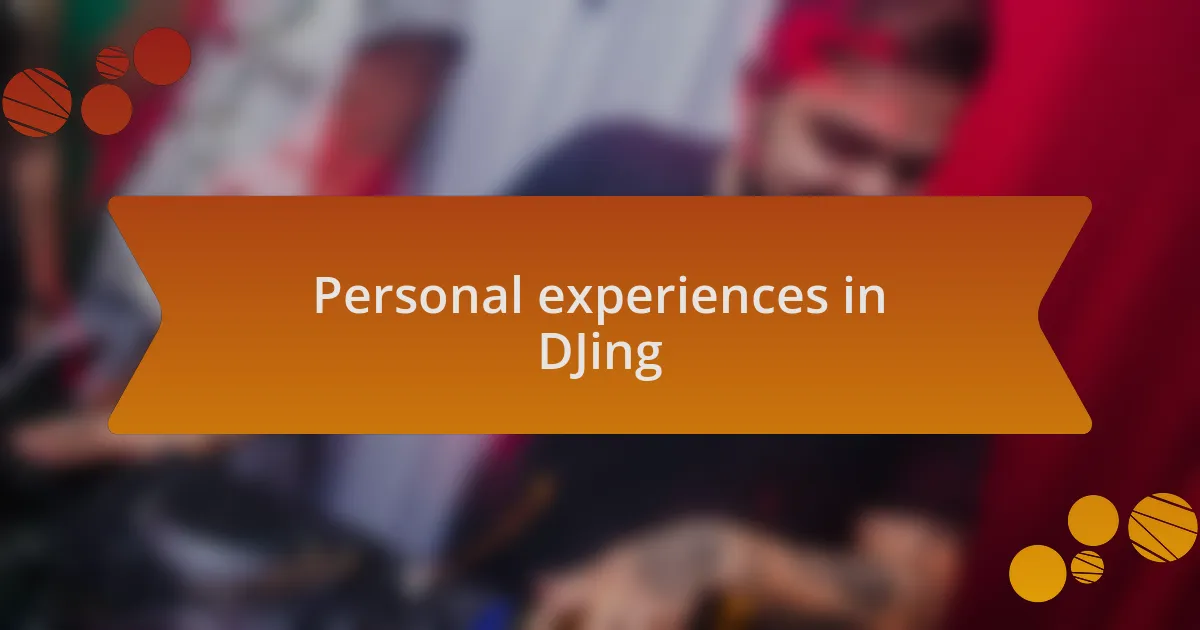
Personal experiences in DJing
There was a night when I played at a cozy bar that was surprisingly packed, and the atmosphere felt electric. As soon as I dropped a bass-heavy track, the crowd erupted, and it hit me how personal this connection was—each beat felt like a heartbeat shared with the audience. I still remember how I couldn’t help but smile as I watched strangers dance together, lost in the music. Have you ever experienced that moment where the world around you fades, and it’s just you and the rhythm?
I’ve also encountered those challenging moments behind the decks when technical issues arise. During one set, my laptop crashed mid-play, leaving me scrambling and urging the crowd to stay with me. I’ll never forget the looks of concern transformed into encouragement as they cheered me on. It’s incredible how the support of a crowd can turn a potential disaster into an exhilarating moment of resilience. Can you recall a time when you found strength in the unexpected?
Lastly, I’ve had nights where everything clicked—my track selection matched the vibe, the crowd was responsive, and time seemed to fly by. I remember a particularly wild party where the energy peaked, and it felt like every person in the room was connected through the music. It’s moments like these that remind me of why I fell in love with DJing in the first place. Have you ever lost track of time, caught up in an experience that felt so perfect?
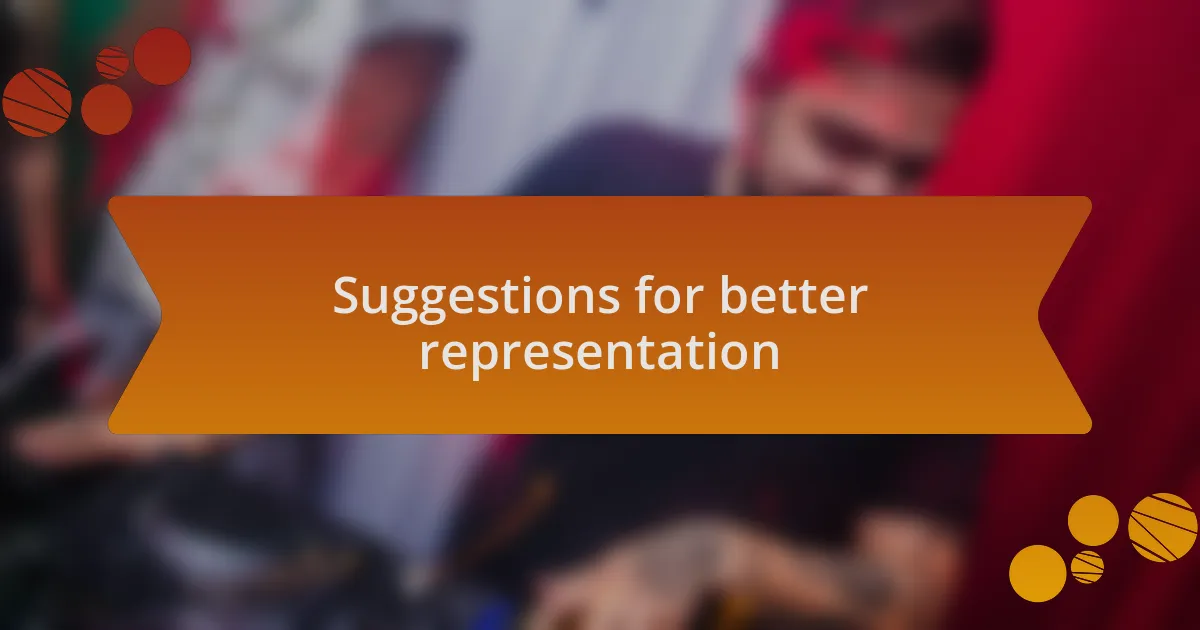
Suggestions for better representation
One important suggestion for better representation in DJing is to actively feature a diverse range of artists. I recall attending an event where the lineup included DJs from different backgrounds, and the fusion of styles created an unforgettable experience. It was a beautiful reminder that varying influences can transform the night and engage different crowds—have you ever noticed how a fresh perspective can change the energy in the room?
Moreover, creating platforms for emerging DJs can significantly enrich the scene. I remember attending a local showcase that highlighted up-and-coming talent; it felt like discovering hidden gems. When we support new artists, we not only foster innovation but also ensure that a wider range of experiences and sounds is shared—and doesn’t everyone benefit from a diverse auditory palette?
Finally, we need to prioritize accessible spaces that welcome all types of audiences. One night, I played at a venue designed with inclusivity in mind, where everyone felt comfortable to express themselves. It struck me how crucial it is for venues to create environments that embrace various identities. Shouldn’t everyone have the chance to feel at home on the dance floor?